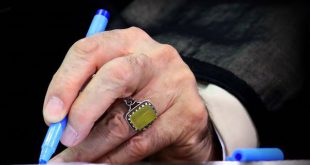A forum was held in the Malaysian capital of Kuala Lumpur to discuss the role of Saudi Arabia, the Zionist regime and the US, in spreading extremism worldwide.
A number of experts from, Malaysia, Singapore and Iran attended the forum entitled “Muslim World Today and Future: Regional Powers, State-Sponsored Terrorism and Religious Extremism.”
It was held Wednesday by the AsiaWay Research Institute in cooperation with Malaysia University of Technology’s Faculty of Islamic Civilization.
Mansoureh Ebrahimi, an Iranian professor at University of Technology, Malaysia, in a speech elaborated on the Middle East conflicts.
Amin Rashid Yatiban from Malaysia’s UUM, in his address underlined the need for peace and security in the Middle East, saying those who oppose peace and security pursue their own interests by fomenting tensions and boosting the Zionist regime.
He said it is necessary that the plots hatched by the Zionist regime and its supporters should be exposed and the power of Muslim unity should be made known to the plotters.
Muhammad Ruslan from the Islam Academy of University Malaya presented a paper titled “How Israel Poses A Serious Threat to Middle East”.
He highlighted the Zionist regime’s aggressions, including attacks on al-Aqsa Mosque, and regretted world powers’ support for the occupying regime.
He also described plans for moving the capital of the Zionist entity from Tel Aviv to Quds (Jerusalem) under US support as a most dangerous step.
He went on to stress that all Muslims should make efforts to counter the threats posed by the Zionist regime in the Middle East.
Qamarul Zaman Yusuf, from University of Technology, Malaysia, elaborated on the conflict of interests between the US and Russia that can lead to conflicts in the strategic Middle East region.
He also highlighted Saudi Arabia’s attempts to export Wahhabi ideology, describing it as dangerous.
Another speaker was Syed Farid al-Attas, a Malaysian author and educator, serving as a professor in the Department of Sociology at the National University of Singapore.
His speech featured extremism. He said there should be a distinction made between extremism and religions.
Al-Attas also noted that extremism is not created in a vacuum but there are conditions that lead to extremism.
For example, he said, attacks by extremist Buddhists in Myanmar could create conditions that may lead to extremism among Muslims there.
Elsewhere, he described Saudi Arabia as exporter of Wahhabism and the US as blatant supporter of extremist Salafists, deploring US Secretary of State Rex Tillerson’s call for creation of a counter-terrorism center in cooperation with Saudi Arabia.
source:iqna
 Ijtihad Network Being Wise and Faithful Muslim in the Contemporary World
Ijtihad Network Being Wise and Faithful Muslim in the Contemporary World
